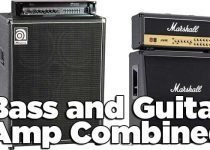5 Best Amp for Harmonica in 2025: Top Picks for Live Gigs
Are you seeking the best amp for harmonica or guitar? This detailed guide helps you pick a harmonica amp confidently today. Harmonica needs a quality amp to sound great. Let’s explore top options, features, and honest reviews.

# Table of Contents =>
- 0.1 Top 6 Amp for Harmonica:
- 0.2 Why You Need An Amp For Harmonica –
- 0.3 How To Choose the Best Harmonica Amp –
- 1 Best Amp For Harmonica: Top Picks for Powerful Tone –
- 1.1 🎸 Fender Frontman 10G Guitar Amplifier –
- 1.2 🎸 LyxPro 20 Watt Electric Guitar Amp –
- 1.3 🎸 Fender Champion 20 Guitar Amplifier –
- 1.4 🎸 Donner DEA-1 10 Watt Guitar Amp –
- 1.5 🎸 Orange Amps Crush Mini 3W Combo –
- 1.6 🎸 Orange Crush Mini Analogue Combo Amp –
- 1.7 How To Set Up Your Harmonica Amp –
- 1.8 Best Settings For Blues Harmonica Players –
- 1.9 🎸 Comparison Table: Best Harmonica Amps –
- 1.10 Frequently Asked Questions –
- 1.11 Conclusion: Pick The Best Harmonica Amp Now:
Top 6 Amp for Harmonica:
Amp Name => | Amp Image => | Features => | Check on Amazon => |
#1. Fender Frontman 10G Guitar Amplifier |
| ||
#2. LyxPro 20 Watt Electric Guitar Amp - |
| ||
#3. Fender Champion 20 Guitar Amplifier |
| ||
#4. Donner DEA-1 10 Watt Guitar Amp |
| ||
#5. Orange Amps Crush Mini 3W Combo |
| ||
# 6.Danelectro Honeytone N-10 Guitar Mini Amp |
|
Why You Need An Amp For Harmonica –
Amplification makes your harmonica sound louder everywhere. It brings out tonal details, warmth, and sweet crunch. An amp helps you perform at gigs confidently. It lets your harmonica cut through band mixes. You also shape tones easily using amp controls.
How To Choose the Best Harmonica Amp –
Choosing the right amp demands careful personal consideration. Let’s look at essential points before buying anything.
Check The Wattage and Volume Needs:
Small practice amps suit home or studio perfectly. Large watt amps handle stage gigs without strain.
Look At The Speaker Size Closely:
Bigger speakers give richer bass, full body. Smaller speakers often focus on bright mids.
Tube Or Solid-State: Pick Your Flavor:
Tube amps deliver warm vintage break-up tones. Solid-state amps are lighter, reliable, affordable options.
Built-in Effects Matter For Harmonica Sound:
Reverb adds space; overdrive brings tasty crunch. Look for amps offering these built-in tonal options.
Portability Helps If You Travel Frequently:
Compact amps work great for busking or jams. Heavy amps stay mostly in home studios comfortably.
Best Amp For Harmonica: Top Picks for Powerful Tone –
Now let’s explore the handpicked top amplifier for harmonica. Each is reviewed with pros, cons, and detailed features.
🎸 Fender Frontman 10G Guitar Amplifier –
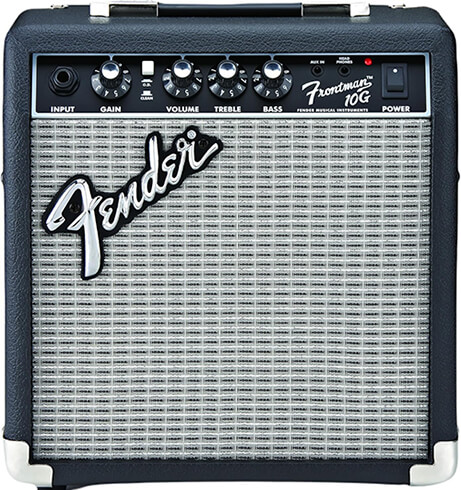
Description & Key Features:
Fender Frontman 10G stands as a beginner’s choice. It packs solid-state power into a small cabinet. 10 watts drive a 6-inch special speaker. It includes a gain knob for crunchy tones.
- Power: 10 watts, solid state clarity
- Speaker: 6-inch, Fender special design driver
- Controls: Gain, volume, treble, bass, simple knobs
- Inputs: Standard 1/4″ guitar input jack
- Extras: Headphone jack for silent practice convenience
Pros and Cons:
✅ Very lightweight, super easy to carry around
✅ Classic Fender clean tone with slight bite
✅ Ideal for bedroom practice or studio sessions
❌ Not powerful enough for large gigs venues
❌ Lacks built-in reverb or other effects modules
Quality Review Summary –
Users call it best budget harmonica amp around. It’s praised for warm clean tones, moderate grit. Easy to dial a classic blues harmonica crunch.
🎸 LyxPro 20 Watt Electric Guitar Amp –
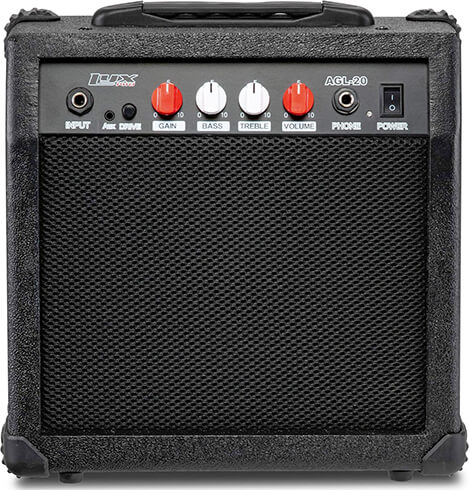
Description & Key Features:
LyxPro 20W offers bigger output for stage needs. It has 6.5-inch speaker, headphone, MP3 input. Clean & Overdrive channels shape diverse harmonica tones.
- Power: 20 watts with robust output headroom
- Speaker: 6.5-inch for rounded mid frequencies
- Controls: Clean, Overdrive, Treble, Bass easily adjustable
- Inputs: Guitar, aux for backing tracks, headphones jack
Pros and Cons:
✅ Louder than most compact amps under budget
✅ Aux input helps jam along favorite tracks
✅ Lightweight, easy handle for carrying anywhere
❌ Lacks built-in reverb effects or modulation
❌ May distort on extreme volume beyond midpoint
Quality Review Summary –
It’s popular among small amp for harmonica seekers. Users love the portable power, decent bass response.
🎸 Fender Champion 20 Guitar Amplifier –
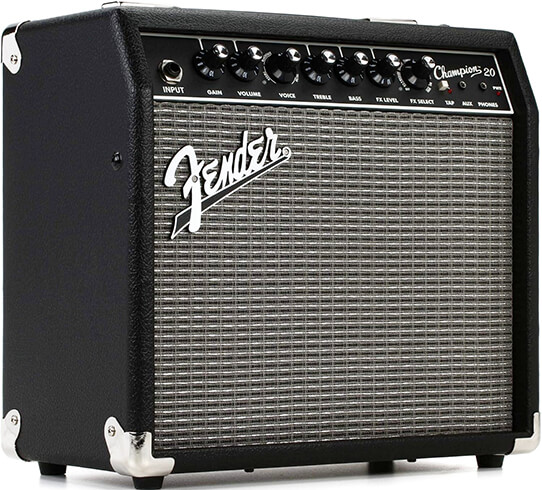
Description & Key Features:
Champion 20 stands a clear step up model. Delivers 20 watts with an 8-inch speaker voice. Built-in reverb, delay, chorus provide essential flavor.
- Power: 20 watts with more clean headroom
- Speaker: 8-inch Fender Special Design driver
- Controls: Gain, Voice (amp types), Treble, Bass
- Effects: Reverb, Delay, Chorus onboard modulation
- Inputs: Aux input + headphone out feature included
Pros and Cons:
✅ Best harmonica amp with reverb under $200 easily
✅ Effects dial makes experimenting super fun anytime
✅ Light enough for gigs, strong studio performance
❌ No footswitch for toggling effects on stage
❌ Not a true tube amp, so lacks tube breakup
Quality Review Summary –
Rated highly in harmonica amplifier reviews everywhere. Players say it’s versatile, perfect for blues harmonica.
🎸 Donner DEA-1 10 Watt Guitar Amp –
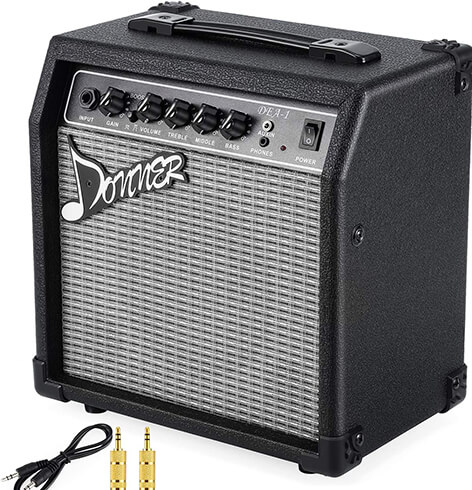
Description & Key Features:
Donner DEA-1 packs serious quality at a low cost.
It’s compact, basic, and perfect for first-time amplifiers.
- Power: 10 watts, great for quiet practices
- Speaker: 6.5-inch, balances highs, mids nicely
- Controls: Volume, Treble, Bass, simple EQ layout
- Extras: Closed-back design enhances punchy bass feel
Pros and Cons:
✅ Cheapest decent amp for harmonica players today
✅ Closed back gives it surprisingly big bottom
✅ Ideal for practicing classic folk or country tunes
❌ Can lack sparkle on some higher registers
❌ Absolutely no effects or reverb on board
Quality Review Summary –
People call it the best practice amp for a harmonica. Delivers a straightforward, clean tone, with a slight warm edge.
🎸 Orange Amps Crush Mini 3W Combo –
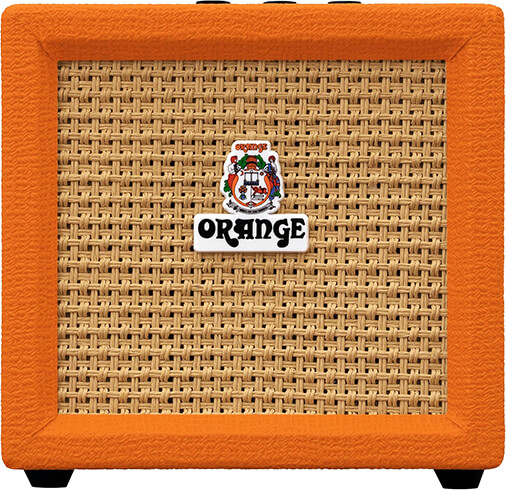
Description & Key Features:
Ultra portable, Orange Crush Mini fits small setups. Runs on batteries or standard power for flexibility.
- Power: 3 watts, perfect for travel or busking
- Speaker: 4-inch custom, tight focused mid response
- Controls: Volume, Shape (EQ), Gain knob unique style
- Extras: Tuner onboard, headphone out for practice
Pros and Cons:
✅ Absolutely tiny, fits in a backpack easily
✅ Shape control gives a broad EQ sweeping sound
✅ Built-in tuner helps stay on pitch live
❌ Very low wattage, only suits quiet environments
❌ No onboard reverb or delay available
Quality Review Summary –
Best for a harmonica mic and amp setup, portable. Travelers love it for street performance or hotel jams.
🎸 Orange Crush Mini Analogue Combo Amp –
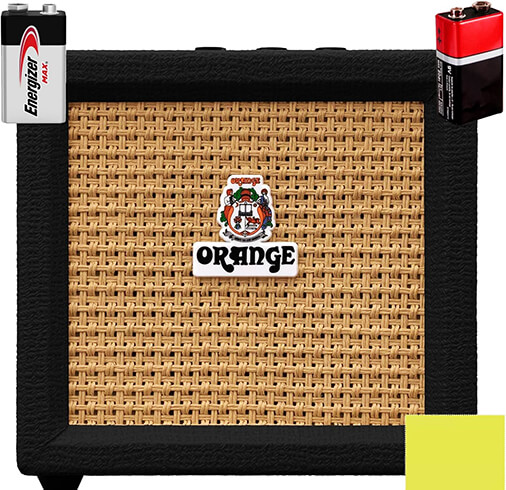
Description & Key Features:
Slightly different design, same portable Orange vibe. Maintains classic analog warmth that people always crave.
- Power: 3 watts for quiet rooms or busking
- Speaker: 4-inch, tight articulate focused punch
- Controls: Volume, Gain, Shape for instant tone adjust
- Extras: Battery or adapter powered for easy carry
Pros and Cons:
✅ Vintage orange crunch even at low volume
✅ Small enough for a suitcase or carry-on luggage
✅ Great for personal practice or coffeehouse gigs
❌ Weak on low-end volume for band scenarios
❌ No reverb or modulation built into the circuit
Quality Review Summary –
Popular among tube amps for harmonica players substitute. Analog circuit gives a vintage-inspired, organic breakup.
How To Set Up Your Harmonica Amp –
Now let’s cover harmonica amp tone settings basics. These tips ensure your harp cuts through nicely.
Use A Good Harmonica Microphone:
Dynamic mics or bullet mics shape harp tones. Plug directly into amp input; adjust gain carefully.
Set Low Gain, Higher Volume For Clean:
Keeps harmonica notes warm, avoids fuzzy overload. Bass and treble adjust until sweet spot shines.
Add Slight Reverb If Amp Supports It:
Makes tone spacious, natural, and fills out beautifully. Delay is also fun for bluesy licks between phrases.
Avoid Too Much Overdrive Quickly:
Too much gain muddies the harmonica’s bright clarity. Use moderate grit for blues crunch satisfaction.
Best Settings For Blues Harmonica Players –
Want the best amp settings for harmonica tone today? Try these general guidelines, tweak for your room.
- Gain: 2-3 for light tube breakup style
- Volume: As high as needed for room fill
- Treble: Around 6-7 for articulation sparkle
- Bass: 4-5 to avoid muddy swampy lows
- Reverb: Small splash around level 2-3 depth
🎸 Comparison Table: Best Harmonica Amps –
| Amp Name | Power | Effects | Best For |
| Fender Frontman 10G | 10W | None | Beginners, home practice |
| LyxPro 20W | 20W | Overdrive | Small gigs, loud practice |
| Fender Champion 20 | 20W | Reverb, delay | Versatile blues, small venues |
| Donner DEA-1 | 10W | None | Budget practice sessions |
| Orange Crush Mini 3W | 3W | Tuner, shape | Travel, street playing |
| Orange Crush Mini Analog | 3W | Shape | Coffeehouse, vintage lovers |
Check: Best Tube Headphone Amplifier for Audiophiles
Frequently Asked Questions –
What is the best amplifier for a harmonica?
The Fender Champion 20 wins for overall flexibility. Offers effects, enough volume, trusted brand performance.
How do I amplify the harmonica sound live?
Use bullet mic into amp, adjust gain carefully. Slight reverb, moderate bass keeps the harmonica clear.
Is a tube amp better for a harmonica?
Tube amps bring warmer, richer vintage breakup tones. But solid state easier, cheaper, more durable option.
Can I use a guitar amp for a harmonica?
Yes, guitar amps work perfectly with a harmonica. Adjust EQ to suit the harmonica’s bright sound.
What’s the best budget amp for a harmonica?
Donner DEA-1 or Fender Frontman 10G shine here. They offer solid sound without breaking the bank.
Conclusion: Pick The Best Harmonica Amp Now:
Finding your best amp for harmonica changes everything. Whether gigging, recording, or practicing, great amps matter. Use this guide, explore sounds, choose your personal favorite. Bring out your harmonica’s soul, enjoy every single note.
Last Updated on October 15, 2025 by Perry Garner

